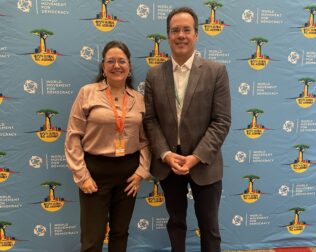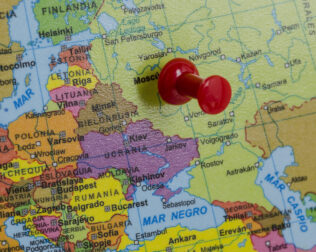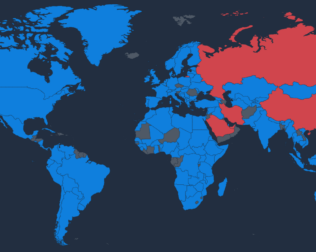By Rick Fawn
In September 2021, diplomats at the Organization for Security and Co-operation in Europe’s (OSCE) headquarters in Vienna saw Russia block the holding of an annual human rights meeting over Moscow’s objections about supposed “regular outbursts of Neo-Nazism among some OSCE participating states.” Five months later, Russian tanks and infantry began an all-out invasion of Ukraine under the pretext of “de-Nazifying” Ukraine.
The 57-state OSCE, and in particular the Office of Democratic Institutions and Human Rights (ODIHR), remains at the forefront of resisting the authoritarian backlash in Europe and Eurasia. Election observation is only one of ODIHR’s eleven activities, but it is a core undertaking that Russia has opposed strongly. ODIHR’s election observation is notable because of the number of people involved in its missions, often in the hundreds, and their broad and increasingly frequent deployment to dozens of countries across the northern hemisphere.
ODIHR also plays a key role in confronting authoritarian pushback against democratization while still succeeding to surmount the multi-faceted challenges it encounters. ODIHR’s resilience is both a symbol of continued support for democracy and an opportunity to resist authoritarian backlash.
RUSSIA’S CHALLENGES TO ODIHR
ODIHR has drawn the ire of many non-democratizing, authoritarian member states of the OSCE—especially Russia. As early as 2003, Moscow began gathering the support of other such states to demand changes in both the control and operation of ODIHR (The source for this material is not publicly available—for more information, please reference the following OSCE references: MC(11).JOUR/2, Annex 4 of 2 December 2003 and MC(12).JOUR/2 Annex 9 of 7 December 2004). A seemingly harmless request, its aims were far more serious and arose from Moscow’s growing concerns about the OSCE’s efforts to safeguard democratic standards and practices. Those apprehensions accelerated when ODIHR was seen as contributing to the so-called “Color Revolutions” and ensuing democratic transitions in Georgia, Ukraine, and Kyrgyzstan in the early 2000s. In response, a shaken Moscow embarked on four forms of authoritarian resistance.
- The Kremlin attempted to reduce ODIHR’s operational independence. Moscow’s accusations against the institution increased in tandem with its demands, including to claims, such as at the 2005 annual meeting of foreign ministers that ODIHR was “an instrument of political manipulation and a destabilizing factor.” That year, Russia’s authorities also blocked passage of the OSCE’s budget in protest over ODIHR’s seeming independence, and sought to require its election reports to be subject to approval by all states, albeit unsuccessfully. Then, in Vladimir Putin’s 2007 speech to the Munich Security Conference, the OSCE was attacked for “interfering in the internal affairs of other countries” and even of “imposing a regime” on Russia.
- Moscow introduced the concept of “sovereign democracy.” This idea granted Russia the confidence to pronounce itself a democracy whose form of governance remains a domestic The Kremlin’s regional allies emulated this practice. The notion also terminated an agreement made by the Soviet Union first in Copenhagen in 1990 and then, ironically, in Moscow in 1991. All European and North American countries committed to the norm that in the CSCE (as the OSCE was previously called) democracy ceased being a domestic prerogative and instead became a shared “international concern.”
- The Kremlin tried to dictate how many observers ODIHR could send to OSCE states. Ultimately, however, this practice was not generally emulated by Moscow’s allies. Most notably, these tensions intensified in 2007, to the point that ODIHR refused to mount an observer mission to the Russian Federation.
- Moscow established new election observation missions in direct competition with ODIHR. Non-democratic countries in the Commonwealth of Independent States (CIS), a regional organization of mostly authoritarian-leaning states, began their own regional election observation operations. The Shanghai Cooperation Organization and the Organization of Turkic States, formed only in 2015, have also joined international election observation missions. These organizations may sound reputable, but in contrast to ODIHR—and its elaborate and publicly available methodologies and findings—they have no established procedures and often provide no findings whatsoever, other than uncorroborated generalities. They do, however, allow their governments to flood domestic media with earnest-sounding accounts from “international election observers” lauding the “fairness” of their elections.
Unsurprisingly, ODIHR and Russian-supported missions have rarely agreed on their overall conclusions. The former finds elections in countries formally part of the Soviet Union to fall short even of basic international electoral commitments; the latter organizations, when a statement is issued, praise the region’s electoral processes. In further contrast, they tend to “evaluate” an election especially on how well it fits with existing domestic laws. Those laws, predictably, hobble the electoral process before it even starts. The alternative observers, however, are given extensive news coverage. Some countries’ media ignore the OSCE’s findings entirely, but have ready and reliable “international observers” who offer euphoric endorsements of elections in these non-democratic states.
These alternative, authoritarian election observation efforts dilute ODIHR’s impact and misguide their populations into believing that their “elections” have been validated internationally. They also reinforce the authoritarian political ethos of their region. As the U.S. Helsinki Commission warned in 2005, “Moscow showed other CIS capitals that, unlike the United States, Russia would not question their right to rule ‘by hook or by crook’ and was a reliable bulwark, unlike the preachy West.” These challenges to ODIHR undermine democracy across the region.
RESPONSES TO RUSSIA’S UNDERMINING OF ODIHR
In a CIS Heads of State meeting chaired by Putin, these observer missions were championed for their “consistent and vigorous efforts” to break ODIHR’s monopoly “as supreme arbiter in this very important area.” How can ODIHR and its supporters counteract these efforts and what role does election observation still play? There are six ways that ODIHR can respond to these challenges, both independently and in concert with other international actors.
- Explain and defend ODIHR’s integrity consistently. Western governments rightly call it the “gold standard,” a term that infuriates the authorities in Moscow and provokes accusations of it being “an instrument of pressure.” Civil society across the OSCE space should speak out against attacks on ODIHR and reiterate confidence in its tested methodology and political neutrality.
- Support should continue for ODIHR’s expansion of election observation to countries “West of Vienna” and its request for inclusion of secondees from countries “East of Vienna.” In 2001, ODIHR established a special fund to train short-term observers from civil society in post-communist countries. These and similar efforts should continue in earnest. Ironically, Western governments now observe that Russia does not always supply observers to the very countries whose elections it claimed ODIHR had conspiratorially neglected to observe.
- Participating states should sustain engagement with ODIHR and reaffirm their commitments to international norms—especially for those states wishing to be part of the democratic West. In particular, Georgia, Moldova, and Ukraine are indicative of this practice. They invite ODIHR to all elections, even at the local level. ODIHR’s work, unlike that of its nondemocratic competitors, does not cease with an election but continues with assistance for electoral reforms.
- Western governments should fund ODIHR’s calls for observers, including for missions in established democracies. They should also ensure that all positions—including the hundreds of short-term observers—are always filled. Even after its full-scale invasion of Ukraine and given its disdain for the OSCE, the Kremlin has continued to fill observer positions on some ODIHR missions. For example, it seconded one core team member, three long-term observers, and 45 short-term members to Kazakhstan to observe its early parliamentary elections in March 2023, the highest number of any state.
- ODIHR should leverage the conditionality of its support to encourage states to increase democratic development and investment, among other development ventures. Continuing to lean on conditionality to encourage democratic development may be a fruitful avenue to counteract authoritarian influence more effectively.
- ODIHR missions must demonstrate international concern for and commitment to democracy in countries denied that freedom. Even with curtailed media, the country-wide presence of full missions (which have been deployed across Eastern Europe and Central Asia, except Turkmenistan) suggests a firm, international commitment by receiving and sending countries. This commitment highlights the indispensable support that persecuted dissidents in communist Eastern Europe and the Soviet Union credited to the human rights dimension of the Helsinki Final Act, the foundation of today’s OSCE.
Authoritarian states have feared the OSCE’s influence and tirelessly worked to counter it. In a world of increasingly inventive authoritarian backlash, ODIHR is more vital and deserving of support than ever. Its contributions to democratization are often subtle, even intangible, but their long-term success and importance are undeniable. We should not be mistaken: ODIHR’s operations are potent and remain consequential, but they also need continued support.
Rick Fawn is a Professor in the School of International Relations at the University of St Andrews, United Kingdom; among his books is International Organizations and Internal Conditionality: Making Norms Matter.
The views expressed in this post represent the opinions and analysis of the author and do not necessarily reflect those of the National Endowment for Democracy or its staff. Image Credit: ArtShotPhoto/Shutterstock.






